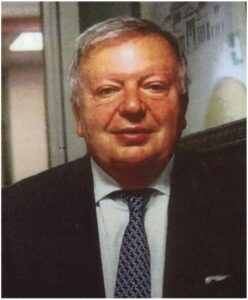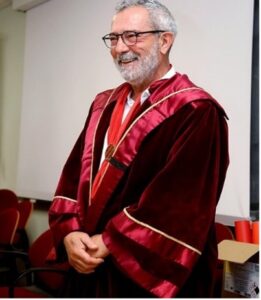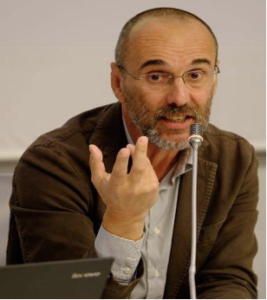
11 giugno 2025
MODERATORI: Prof. Luigi Bonizzi (Presidente Associazione Nazionale Infettivologi Veterinari)
Dr.ssa Francesca Biondo (Direttrice Federpesca)
8.00: Globalization, climate change and spillover: the challenges of the third millennium for public health and food production.
(Globalizzazione, cambiamenti climatici e spillover le sfide del terzo millennio per la sanità pubblica e le produzioni alimentari).
Relatore: Prof. Romano Marabelli – Consigliere del Direttore Generale dell’Organizzazione mondiale della Sanità Animale (WOAH)
8.30: Impacts of climate change on animal welfare and health.
(Impatto del Cambiamento Climatico sul benessere e la salute animale).
Relatore: Prof. Nicola Lacetera – Dipartimento Di Scienze Agrarie E Forestali – UNITUS
9.00: Impact of climate change on Apis mellifera: a risk to global eco-food sustainability.
(Impatto del cambiamento climatico su Apis mellifera: un rischio per la sostenibilità eco-alimentare globale)
Relatore: Prof. Michele Amorena, Dipartimento di Bioscienze e Tecnologie agro-alimentari e ambientali, Università degli Studi di Teramo
9.30: Impact of climate change toward food safety in fish chain
(Impatto del cambiamento climatico sulla sicurezza alimentare nel comparto ittico)
Relatrice: Prof.ssa Tiziana Pepe – Dipartimento di Medicina veterinaria e produzioni animali -UNINA

Prof Romano Marabelli: Honorary President and Advisor to the Director General of the Oie, Member of the French Veterinary Academy and Honorary Professor of Veterinary Medicine at the University of Parma; he was Secretary General of the Ministry of Health and a member of the Strategic Committee for Health in Bruxelles

Dr. Tiziana Pepe is Full Professor at Department of Veterinary Medicine and Animal Production, University “Federico II”, Naples, Italy. She obtained the degree in Veterinary Medicine at the Faculty Veterinary Medicine of Naples “Federico II” Italy with 110/110 cum laude. Ph. D. in Food Inspection. She is Director of the School of Specialization in “Food Inspection of Animal Origin”, Department of Veterinary Medicine and Animal Production, University “Federico II”, Naples, Italy.
Topics of the research are: species identification in sea-food products using DNA analysis, study of the fragments sequence of mitochondrial cytochrome b in prepared and processed fish products, use of end-point PCR (conventional, nested, multiplex) and real-time for the identification of fish species and microbial pathogenic species: Campylobacter jejuni (analysis of sequences of flaA SVR fragment); Escherichia coli 0157: H7; Salmonella spp.; Listeria spp.; Vibrio spp and Norovirus, application of two-dimensional electrophoresis and mass spectrometry techniques for the identification of fish species in fresh and prepared products, proteomic analysis of Tuna species, implementation of Real Time PCR for detection of bovine species in samples of sausage mixture. Species identification through analysis of sequences of mitochondrial cytochrome b fragment in milk
Her research activity is summarized in more than 150 Scientific publications, whose results have been communicated in National and International.

Prof. Amorena
Degree in Veterinary Medicine – Faculty of Veterinary Medicine of the University of Naples “Federico II”.
Phd in Animal Breeding Sciences. Since 2002 he has been a full professor for the Scientific Disciplinary Sector in Veterinary Pharmacology and Toxicology at the Department of Biosciences, Agri-food and Environmental Technologies of the University of Teramo.
Director of the School of Specialization in Food Inspection of o.a. “G.Tiecco”. President of the UNITE Foundation.
Head of Animal Welfare for the user establishment for the Danio rerio species and Coordinator of the OPBA of the University of Teramo.
The main research topics concern the toxic effects of Persistent Organic Pollutants (POPs) on the environment with implications of residual toxicity in food. Among the compounds studied are polychlorinated biphenyls (PCBs), organochlorine pesticides, polycyclic aromatic hydrocarbons (PAHs), organochlorine compounds and some heavy metals. These studies were conducted both using bioindicators (raptors, mammals, fish, molluscs and Apis mellifera) and through experimental studies conducted on laboratory animals or in vitro to evaluate some aspects of chronic toxicity and toxicokinetics. Current studies are instead focused on the mechanisms of neurotoxicity and reproductive toxicity of different pollutants on zebrafish.

Prof. Lacetera
In 1986 he graduated in Veterinary medicine at the University of Perugia (Italy).
In 1990 he joined the University of Tuscia (Viterbo, Italy) as assistant professor at Institute of Animal Science.
Currently he is full professor at the Department of Agriculture and Forest Sciences in the same University.
He was visiting professor at Caldwell Animal Hospital (NC, USA, 1986), Department of Microbiology at Colorado State University (CO, USA, 1988-1989), Department of Animal Health and Husbandry at University of Bristol (UK, 1994 and 1995), Laboratoire Associé de Recherches sur les Lentivirus chez le Petits Ruminants at the Ecole Vétérinaire of Lion (France, 1997), Commonwealth Scientific and Industrial Research Organization at Brisbane (Australia, 2015 and 2016).
His main areas of research are the interactions between metabolism, immune response and health in dairy ruminants and the effects of heat stress on physiology, health and performance of dairy cows. Immunology, disease resistance and risk of death are the main topics of his research in the field of animal biometeorology. In the last few years, his research work focused also on the environmental impacts of livestock systems.
Hi is coauthor of more than 200 publications, which include original research papers, book chapters, and popular articles.